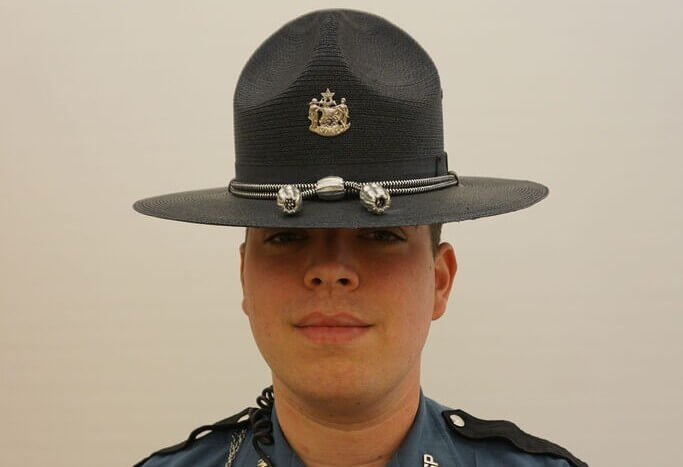Judge’s Ruling Confirms Maine Cop Racially Profiled ‘Thug’ Driver Caught With Cocaine, Pills, And Gun
Source: BDN / Maine State Police
A federal judge in Portland, Maine ruled that evidence found by state troopers during a traffic stop cannot be used in court because officers racially profiled a black motorist before pulling him over.
According to authorities, in August 2019, Trooper John Darcy pulled over a black motorist driving through York, Maine. Police seized about 140 grams of cocaine, 880 counterfeit prescription pills, and a fully loaded gun from the car during the stop.
But moments before the stop, Darcy was recorded telling another officer through walkie-talkie that the black motorist had dreadlocks, looked like a “thug,” and had on a wifebeater.
Monday the U.S. District Judge Nancy Torresen ruled that the initial stop was unconstitutional because Darcy racially profiled the black motorist and none of the evidence collected could be used in the case.
What seemed like a slam dunk case filled with tons of incriminating evidence was now looking like a disaster for the prosecution. The decision could lead to the dismissal of all charges in the case.
Officer Darcy also claimed he pulled over the vehicle because it was allegedly going 45mph and crossed out of its lane three times, but Judge Torresen wasn’t buying any of it.
After reviewing Darcy’s dashboard camera, Judge Torresen said the officers’ testimony contradicted what she witnessed on video. The body cam did not show the vehicle crossing lanes and going into the breakdown lane.
The judge also stated she did not believe the car was going 45mph.
“The traffic stop came six minutes after that call to the dispatcher, and it happened about 6 miles north of where Darcy first spotted the minivan, meaning the vehicle was likely traveling about 60 mph, said Judge Torresen.
The driver in this case has pleaded not guilty to a charge of possession of fentanyl and heroin with intent to distribute.
Maine has a black population of less than 2%. This disparity leaves many black motorists feeling like more of a target than the folks protected. Although Maine has made efforts to try to end racial profiling in the state, its new laws leave too much up to the officer and his judgment.
According to WGME, new legislation will require police to record the driver’s race, color, ethnicity, gender, age, and reason for the stop.
Drivers also won’t be required to give this information, it will be left up to the officer’s judgment.
When you are 2% of the population, an officer’s judgment can be the main reason you end up in jail.
Jack McDevitt of the Race & Justice Institute at Northeastern University believes it important to record what officers perceive but also understands how perception can be flawed when looking only through the lens of the majority.
“What is important is what the officer perceived you as because if there is any profiling, that’s going to be based on the officer’s perception, not on how we all self-identify,” McDevitt said.
SEE ALSO:
[ione_media_gallery id=”3440564″ overlay=”true”]

